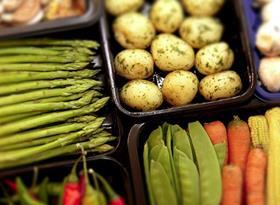
A roadmap outlining steps that some of the UK's leading businesses should take to reduce plastic pollution has been published by environmental charity Wrap.
TheUK Plastics Pact Roadmap to 2025builds on the UK Plastics Pact – launched in April and signed by the likes of Aldi, Asda, Coca-Cola and M&S – which set four targets for Britain to meet by 2025, with the aim of creating a circular economy for plastics.
These are: to make 100 per cent of plastic packaging reusable, recyclable or compostable; to ensure that 70 per cent of plastic packaging is effectively recycled or composted; to see that, on average, 30 per cent of the material used in plastic packaging has been recycled; and to try to eliminate unnecessary single-use plastics items by removing them, redesigning them or reusing them.
The new roadmap advises the 68 members of the UK Plastics Pact, whichare responsible for eighty per cent of plastic packaging sold through UK supermarkets, on the measures they can take to achieve the agreement’s ambitious targets, when these need to be taken by, and some of the key challenges businesses will face.
The roadmap, which Wrap described as “a living document that will change over time”, also includes guidance on how government and citizens can work together to move towards a circular economy for plastics.
The charity’s chief executive Marcus Gover said:“We have 68 of the UK’s largest businesses and organisations committed to the UK Plastics Pact from retail and brands, manufacturers and hospitality, to the plastic supply sector, recycling and resource management.
“I’m very impressed with progress made in the first six months since we launched the pact; this is proving to be a powerful and motivated group.
“The roadmap is a real opportunity for them to forge ahead and make change happen at scale, and in significant ways, but these targets cannot be delivered by business action alone. It needs policy intervention as well as consumers to play a part.”
The 2025 roadmap lays out interim targets for increasing recycling and the use of recycled content, with three milestone dates set in April 2019, the end of 2022 and finally by 2025.
Achieving this will require investment in recycling infrastructure but it is expected to generate new jobs and reduce the amount of plastic waste that has to be exported to other countries.
Wrap will also look to improve sorting, recycling and the use of recycled content, and to support this a competition was launched in October to develop flagship projects, with £1.4 million of funding up for grabs.
The competition forms part of the £20m Plastic Research and Innovation fund, announced by the Chancellor in the Autumn Statement in 2017, to engage scientists to find sustainable approaches to plastics.
The next steps for Wrap will be to continue encouraging UK Plastics Pact members to work together to influence the design and selection of packaging materials and products, both own label and branded.
In the coming months the charity will also publish further guidance on recyclability, including the recyclability of card-based packaging.
To achieve the roadmap milestones, members will need to create their own action planthat supports each target set out in the pact, with Wrap monitoring progress and identifying the opportunities to collaborate with other businesses.
In addition, Wrap said it would work on several projects ahead of the first milestone, such as making a film on household recycling, developing criteria for unnecessary and problematic plastics, and finding new ways of tackling them.



